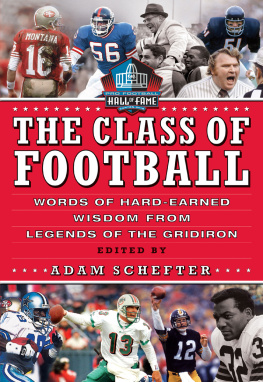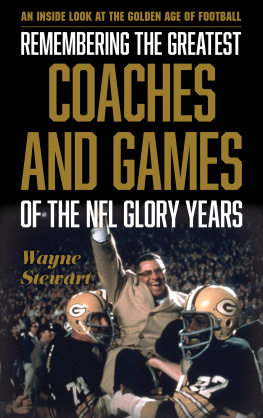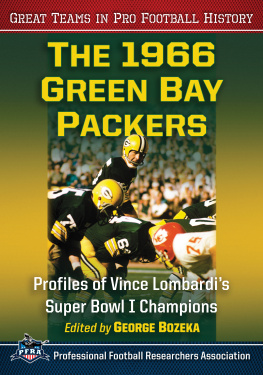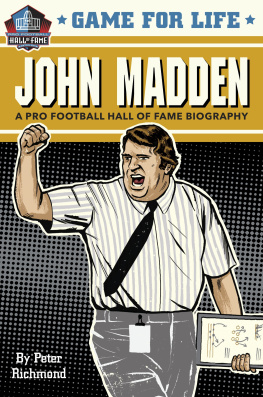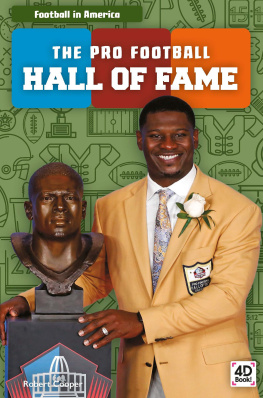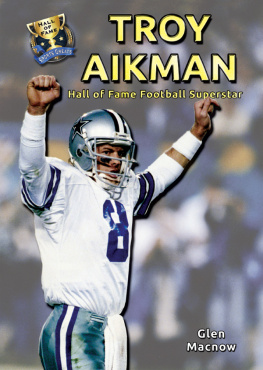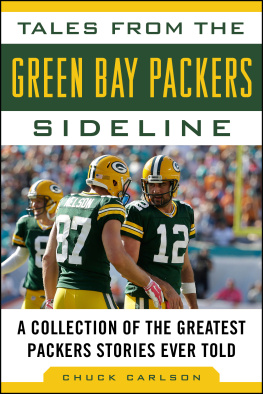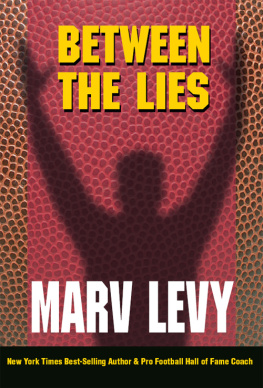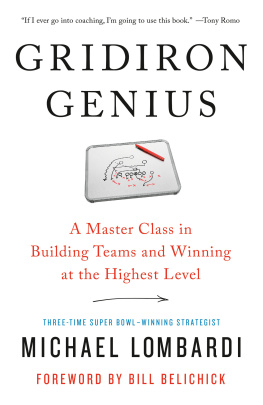We thank thee for this great sport of football, not only for the pleasure we derive as spectators, but also for the invaluable training that young men across America in high schools, colleges, and the professional rank derive as they participate. There are lessons in sportsmanship, fair play, and teamwork.
We ask that it may always be so and that the many who lead and coach, these who are to be enshrined here today, the stars of yesterday, as well as those who are the stars of today, might be aware of the tremendous influence they exert on American youth. May that influence always be in the right direction. Help them to be aware that to whom much is given much shall be required.
We pray also for those many young men whove exchanged the football uniform for that of a solider, and who now serve this nation in the armed forces around the world. We ask thy protection upon them and pray for the day when they can be returned to this land.
R EVEREND H AROLD H ENNIGER, P ASTOR OF THE C ANTON B APTIST T EMPLE, 1966 I NDUCTION C EREMONIES
THINK BACK TO GRADE SCHOOL, TO HIGH SCHOOL, TO your favorite teacher. Mine was football.
The tackle football games we used to have at Macomb Street playground, right up the block from where we lived in Washington, D.C., taught me a great deal. My brothers, my friends, whoever was around, wed take off our jackets, our sweatshirts, whatever layers of clothes we could. Those layers would form the outlines of the sidelines and end zones, an instant football field. Everyone played. Everyone tried. Everyone battled. Wed play every day, as long as we could. Right then, I started to get a taste of what was unique about football. There was nothing like the physical challenges, the collective goals, and the multiple sacrifices of it in teaching us what it took to be successful.
Lessons came in other ways, too. One time, when I was eight years old, in the second grade at John Eaton Elementary School in Washington, our class was told that two Redskins, Brig Owens and Mike Bass, were coming in to talk to our class. You remember Mike Bass. He was the Redskins safety that intercepted Dolphins kicker Garo Yepremians failed field goal with two minutes left in the fourth quarter of Super Bowl VII and returned it forty-nine yards for a touch-down. Its still replayed, even now. Mr. Owens and Mr. Bass came to our school and delivered a message I still remember today. It was all about what it took to be successful. In their case, it was all about hard work, determination, sacrifice. What was true then is still true now.
As powerful as that moment was, the turning point of my childhood came in high school, in the fall of 1976, after another football practice. At the time, I was a tight end. We were running laps and the moment was so memorable, I can still tell you the exact spot I was standing on the track when the thought hit me. Right then, I realized other players might be better and faster, but none would work any harder. I could outrun them simply by outworking them. Right then I learned if you worked harder, you could achieve. So I just kept going.
I kept going whenever any goal was important. Right after college, I kicked off my NFL letter-writing campaign, mailing about forty letters to NFL teams, NFL Properties, and the NFL Management Council, and one I still have to NFL commissioner Pete Rozelle.
July 2, 1981
Dear Mr. Rozelle:
I am writing to you in reference to any job openings you may have in your offices.
Having just finished my undergraduate education at Washington and Jefferson College this past May, I am presently looking for a position in the management of professional sports. Being an avid football fan, I have always desired a career in the NFL. Consequently, as a great admirer of you, it would be both an honor and a pleasure to work for you in any position that may be available.
Thank you for your consideration. I look forward to hearing from you.
Respectfully,
Roger S. Goodell
I received a big pile of rejection letters, including many from the NFL owners that eventually hired me as their commissioner. But Commissioner Rozelle did have one of his top aides, Don Weiss, interview me. And after our interview, I sent him handwritten letters almost every week, not taking no for an answer, until finally he realized that this kid must really want this job. In 1982, Weiss offered me a three-month internshipprobably just to get me to stop writing him. His offer allowed me to combine my undergraduate degree from Washington and Jefferson with the masters I went on to earn from Rozelle and Tagliabue. Those menmy mentorsshaped my knowledge and beliefs about the NFL.
Some of them: Change before youre forced to change. Address issues directly. Look around corners. Challenge assumptions. Dont assume you know the answers; be a good listener. Never be satisfied with results. Find a better solution. Always look for a better way. Hire a great team with strong skills. Set the bar high and raise it continually. Make people accountable. Have integrity. I always tell our team here at the NFL, Its not just results, its how you achieve those results that counts. There can be no compromise between results and integrity.
Football has taught me that teamwork is critical. We see NFL teams prove it each season. We see Hall-of-Fame players accentuate it during their enshrinement speeches each summer. Just listen to what they say. Listen closely. Read the passages in this book. Notice how Hall of Famers dont reflect on their talents; they reflect on their coaches, their teammates, their family and friends. They do not make it about what they accomplished individually; they make it about what they accomplished collectively. They recognize everything and, more important, everyone it took to make them successful. It is vital that the players of today connect themselves to the leagues rich history. The players of today need to recognize the contributions of the many that came before them.
The priority of teamwork is one of the concepts that makes football so unique. Of course there are many. People ask me all the time, as much as any other question I get, What makes football special? Plenty. Its all in the pages of this book, all the lessons there are to be learned. Its the camaraderie and the contact, the competition and the passion, the strategy and the energy, the elements and the emotion. Its so much. Theres nothing better than walking into Lambeau Field on a snowy day in January, with close to seventy-three thousand screaming fans, and two teams battling the way they would if they were on any playground in the country.
But maybe my favorite part of football is that every game, like every day, brings a different challenge. Every game, like every day, brings a different opponent. Games, like days, have unexpected changes and challenges. Every time there is a chance to rise up and win. I learned this back at Macomb Street playground in Washington and in the commissioners office at 280 Park Avenue in New York.
Football keeps inspiring me. Football keeps teaching me.
Roger Goodell

